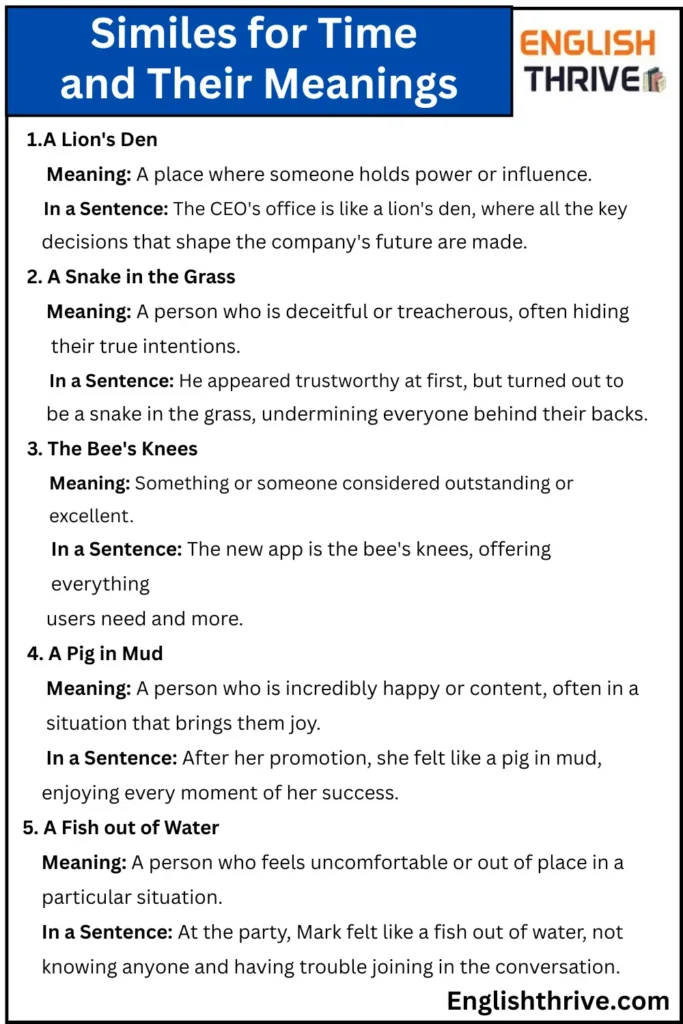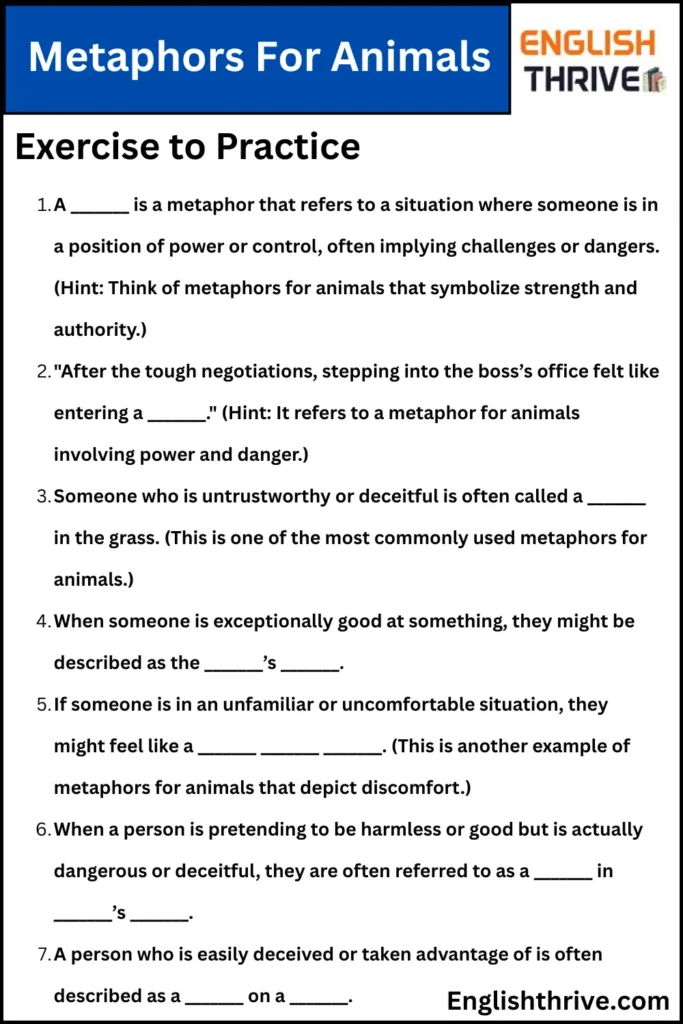Metaphors have the unique ability to enhance our communication by bringing abstract ideas to life. Among the most vivid and expressive metaphors for animals are those drawn from the animal kingdom. These metaphors not only make language more colorful but also help convey complex meanings in a simple yet impactful way.
In this article, we’ll dive into the fascinating world of metaphors for animals, exploring their meanings, historical origins, and how they continue to shape modern communication. Whether you are a student, a writer, or simply someone intrigued by language, this guide will shed light on the richness that animal metaphors bring to everyday conversation.
Contents
ToggleWhat Are Animal Metaphors?
An animal metaphor uses characteristics or behaviors associated with an animal to describe a person, situation, or thing. These metaphors draw from the nature, habits, and symbolism of animals, giving a new dimension to our understanding of concepts. Think of a “lion’s heart” symbolizing courage or a “fish out of water” representing discomfort.
Why Do We Use Metaphors For Animals?
-
Clarity: Metaphors for animals often make complex ideas easier to understand. For example, describing someone as a “wolf in sheep’s clothing” instantly conveys deceit without needing long explanations.
-
Creativity: They infuse creativity and imagination into language, making communication more interesting.
-
Relatability: Animals are a part of the natural world, and their behaviors are familiar to most people. This common ground makes animal metaphors universally relatable.
-
Expressiveness: The animal kingdom is diverse, with each creature representing different traits and qualities. Whether you are describing strength, cunning, or peace, there’s likely an animal metaphor to suit your needs.
Now, let’s explore 25 common metaphors for animals, unpacking their meanings and usage to provide you with a deeper understanding.
25 Common Metaphors For Animals
1. A Lion’s Den
-
Meaning: A place where someone holds power or influence.
-
In a Sentence: The CEO’s office is like a lion’s den, where all the key decisions that shape the company’s future are made.
2. A Snake in the Grass
-
Meaning: A person who is deceitful or treacherous, often hiding their true intentions.
-
In a Sentence: He appeared trustworthy at first, but turned out to be a snake in the grass, undermining everyone behind their backs.
3. The Bee’s Knees
-
Meaning: Something or someone considered outstanding or excellent.
-
In a Sentence: The new app is the bee’s knees, offering everything users need and more.
4. A Pig in Mud
-
Meaning: A person who is incredibly happy or content, often in a situation that brings them joy.
-
In a Sentence: After her promotion, she felt like a pig in mud, enjoying every moment of her success.
5. A Fish out of Water
-
Meaning: A person who feels uncomfortable or out of place in a particular situation.
-
In a Sentence: At the party, Mark felt like a fish out of water, not knowing anyone and having trouble joining in the conversation.
6. A Fox in the Henhouse
-
Meaning: A person who is in a position of trust but is untrustworthy.
-
In a Sentence: It’s risky to leave him in charge; he’s a fox in the henhouse and could steal the company’s secrets.
7. A Bear Hug
-
Meaning: A tight, affectionate hug that conveys warmth and love.
-
In a Sentence: They embraced in a bear hug after years of separation, their joy filling the room.
8. A Snake Oil Salesman
-
Meaning: A person who sells something fraudulent or ineffective, often through deceptive marketing.
-
In a Sentence: The miracle cure promised by that ad is nothing but a scam—a snake oil salesman in disguise.
9. A Wild Goose Chase
-
Meaning: A futile or hopeless pursuit, often leading nowhere.
-
In a Sentence: The quest for the ancient treasure turned into a wild goose chase, with no sign of the prize after weeks of searching.
10. A Wolf in Sheep’s Clothing
-
Meaning: A person who disguises their true, malicious nature behind a mask of innocence.
-
In a Sentence: At first, she seemed like a friend, but later revealed herself to be a wolf in sheep’s clothing, manipulating everyone for personal gain.
11. A Sheep in Wolf’s Clothing
-
Meaning: A person who appears threatening or capable but is actually weak or harmless.
-
In a Sentence: The intimidating businessman turned out to be a sheep in wolf’s clothing, avoiding confrontation at every turn.
12. A Cat Got Your Tongue?
-
Meaning: A phrase used to ask someone why they are suddenly silent or unwilling to speak.
-
In a Sentence: Everyone waited for his response, and when he didn’t speak, she teased, “Cat got your tongue?”
13. A Bird in the Hand
-
Meaning: Something that is certain or already owned, as opposed to something uncertain or risky.
-
In a Sentence: Instead of gambling with new opportunities, he preferred the bird in the hand—his current, stable job.
14. A Fish on a Hook
-
Meaning: A person who is easily deceived or tricked into something.
-
In a Sentence: His trusting nature made him a fish on a hook, falling for scams at every turn.
15. A Tiger by the Tail
-
Meaning: A situation that is difficult to control or manage, often with risky consequences.
-
In a Sentence: Juggling multiple projects felt like having a tiger by the tail—unstable and hard to manage without facing setbacks.
16. A Horse of a Different Color
-
Meaning: Something that is unrelated or different from the topic at hand.
-
In a Sentence: While discussing budget cuts, mentioning the new product launch was a horse of a different color, distracting the team from the main issue.
17. A Deer in the Headlights
-
Meaning: A person who is frozen in place, often due to fear or confusion.
-
In a Sentence: When the boss asked her a difficult question, she looked like a deer in the headlights, unable to respond.
18. A Dolphin in a School of Sharks
-
Meaning: A person who feels out of place or doesn’t fit in with a group.
-
In a Sentence: At the corporate meeting, she felt like a dolphin in a school of sharks, overwhelmed by the aggressive and competitive environment.
19. A Rat Race
-
Meaning: A competitive and exhausting situation, often for success or wealth, with little reward.
-
In a Sentence: The constant pressure to outperform everyone else turned the office environment into a rat race, where personal well-being was often overlooked.
20. A Bird’s-Eye View
-
Meaning: A broad, overall perspective of a situation, often from a higher vantage point.
-
In a Sentence: Stepping back to gain a bird’s-eye view of the project allowed him to identify flaws and potential improvements.
21. A Fox Guarding the Henhouse
-
Meaning: A situation where someone who should not be in charge is given responsibility, often leading to disaster.
-
In a Sentence: Placing the least qualified person in charge of finances was like a fox guarding the henhouse—things quickly went awry.
22. A Leopard Cannot Change Its Spots
-
Meaning: A person cannot change their inherent nature or character, no matter how hard they try.
-
In a Sentence: After a year of promises, she realized he was still the same person— a leopard cannot change its spots.
23. A Lion’s Share
-
Meaning: The largest or most significant portion of something.
-
In a Sentence: After the successful product launch, she received the lion’s share of the credit, being the driving force behind the project.
24. A Rabbit Out of a Hat
-
Meaning: A surprising or unexpected solution to a problem, often appearing out of nowhere.
-
In a Sentence: The team was stuck on the problem for weeks, but the new manager pulled a rabbit out of a hat, solving the issue in one meeting.
25. A Chicken and Egg Situation
-
-
Meaning: A dilemma where it is difficult to determine the cause and effect, as both seem equally responsible.
-
In a Sentence: It’s a chicken and egg situation when trying to determine if the low employee morale caused poor performance or if the reverse is true.
-
Exercise to practice :
-
A _______ is a metaphor that refers to a situation where someone is in a position of power or control, often implying challenges or dangers. (Hint: Think of metaphors for animals that symbolize strength and authority.)
-
“After the tough negotiations, stepping into the boss’s office felt like entering a _______.” (Hint: It refers to a metaphor for animals involving power and danger.)
-
Someone who is untrustworthy or deceitful is often called a _______ in the grass. (This is one of the most commonly used metaphors for animals.)
-
When someone is exceptionally good at something, they might be described as the _______’s _______.
-
If someone is in an unfamiliar or uncomfortable situation, they might feel like a _______ _______ _______. (This is another example of metaphors for animals that depict discomfort.)
-
When a person is pretending to be harmless or good but is actually dangerous or deceitful, they are often referred to as a _______ in _______’s _______.
-
A person who is easily deceived or taken advantage of is often described as a _______ on a _______.
-
A situation that is impossible to control or difficult to manage is often compared to having a _______ by the _______.
-
A _______ in a _______ of _______ is someone who is out of place or does not fit in. (This metaphor for animals speaks to the feeling of being out of place.)
-
When someone pretends to be more capable or confident than they truly are, they may be considered a _______ in _______’s _______.
Answers:
-
Lion’s den
-
Lion’s den
-
Snake
-
Bee’s knees
-
Fish out of water
-
Wolf in sheep’s clothing
-
Fish on a hook
-
Tiger by the tail
-
Dolphin in a school of sharks
-
Sheep in wolf’s clothing
FAQs: Metaphors for Animals
1. What is a metaphor for animals?
A metaphor for animals uses characteristics or behaviors of an animal to describe a person, situation, or thing.
Example: “He’s a wolf in sheep’s clothing” describes someone who hides their malicious nature.
2. Why do we use animal metaphors?
-
Clarity: They simplify complex ideas.
-
Creativity: They make language more engaging.
-
Relatability: People are familiar with animal behavior.
-
Expressiveness: Animals represent traits like courage, cunning, or gentleness.
3. What are some common animal metaphors for power or authority?
-
Lion’s den: a place of control or influence
-
Lion’s share: the largest or most important part
-
Tiger by the tail: a situation that is hard to control
4. Which animal metaphors describe deceit or untrustworthiness?
-
Snake in the grass: a deceitful person
-
Wolf in sheep’s clothing: someone pretending to be good but is dangerous
-
Fox in the henhouse: an untrustworthy person in a position of trust
Conclusion:
Metaphors for animals are more than just figurative expressions; they are a powerful tool that enriches language, making it more expressive and engaging. These metaphors draw on the natural world to help us communicate complex ideas in simple, vivid ways. Whether it’s a “lion’s den” to describe a high-pressure situation, a “fox in the henhouse” to refer to someone untrustworthy, or a “wild goose chase” to characterize a futile pursuit, each animal metaphor adds depth and imagery to our conversations.
By understanding and using these animal metaphors, you can make your language more colorful and relatable, helping others see the world from a new perspective. These metaphors are an integral part of our daily speech, literature, and even business, making communication more nuanced and interesting.



